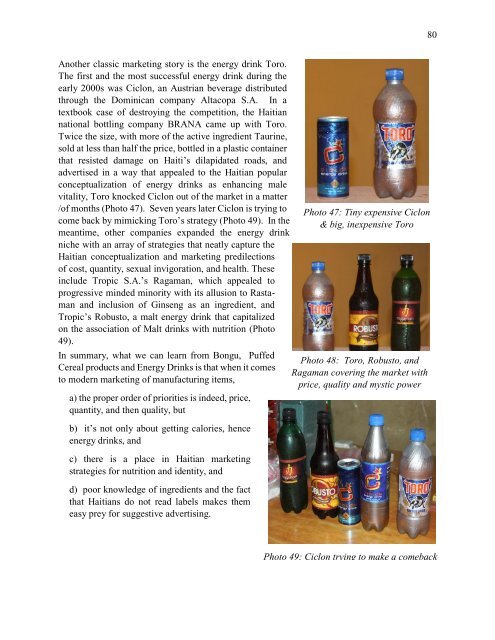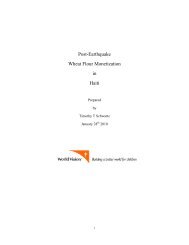Food Consumption Patterns Part 2
Create successful ePaper yourself
Turn your PDF publications into a flip-book with our unique Google optimized e-Paper software.
80<br />
Another classic marketing story is the energy drink Toro.<br />
The first and the most successful energy drink during the<br />
early 2000s was Ciclon, an Austrian beverage distributed<br />
through the Dominican company Altacopa S.A. In a<br />
textbook case of destroying the competition, the Haitian<br />
national bottling company BRANA came up with Toro.<br />
Twice the size, with more of the active ingredient Taurine,<br />
sold at less than half the price, bottled in a plastic container<br />
that resisted damage on Haiti’s dilapidated roads, and<br />
advertised in a way that appealed to the Haitian popular<br />
conceptualization of energy drinks as enhancing male<br />
vitality, Toro knocked Ciclon out of the market in a matter<br />
/of months (Photo 47). Seven years later Ciclon is trying to<br />
come back by mimicking Toro’s strategy (Photo 49). In the<br />
meantime, other companies expanded the energy drink<br />
niche with an array of strategies that neatly capture the<br />
Haitian conceptualization and marketing predilections<br />
of cost, quantity, sexual invigoration, and health. These<br />
include Tropic S.A.’s Ragaman, which appealed to<br />
progressive minded minority with its allusion to Rastaman<br />
and inclusion of Ginseng as an ingredient, and<br />
Tropic’s Robusto, a malt energy drink that capitalized<br />
on the association of Malt drinks with nutrition (Photo<br />
49).<br />
In summary, what we can learn from Bongu, Puffed<br />
Cereal products and Energy Drinks is that when it comes<br />
to modern marketing of manufacturing items,<br />
a) the proper order of priorities is indeed, price,<br />
quantity, and then quality, but<br />
b) it’s not only about getting calories, hence<br />
energy drinks, and<br />
c) there is a place in Haitian marketing<br />
strategies for nutrition and identity, and<br />
d) poor knowledge of ingredients and the fact<br />
that Haitians do not read labels makes them<br />
easy prey for suggestive advertising.<br />
Photo 47: Tiny expensive Ciclon<br />
& big, inexpensive Toro<br />
Photo 48: Toro, Robusto, and<br />
Ragaman covering the market with<br />
price, quality and mystic power<br />
Photo 49: Ciclon trying to make a comeback
















